2025 Seasons & Special Release Episodes
In this special release episode, Just Science sat down with Stacy Sechrist, community violence researcher at RTI International, Jesse Brey, criminal justice researcher and PhD student at Temple University, and Harrod Emmanuel Clay Jr., pastor and community-based advocate, to discuss findings from RTI’s Victim and Witness Participation research project, which is supported by the philanthropy Arnold Ventures.
For individuals who have experienced or witnessed severe community violence, there is often hesitation to report the crime, participate in law enforcement interviews, or engage in court proceedings. To better understand these barriers, community violence researchers at RTI International and Temple University conducted interviews with individuals who had recently experienced incidents of severe community violence, and found that fear of retaliation, concerns about social consequences, and poor communication from law enforcement are among the most significant obstacles to victim and witness engagement in the criminal legal system. Listen along as Stacy, Jesse, and Pastor Clay describe the importance of giving victims and witnesses a voice after violent crime, common themes found across the research interviews, and important considerations for improving the legal system’s response to victim and witness participation.
This episode is funded by RTI International’s Justice Practice Area.
Some content in this podcast may be considered sensitive and may evoke emotional responses or may not be appropriate for younger audiences.
Listen to all podcast episodes here: Apple Podcasts, Stitcher, Soundcloud, Spotify, & YouTube Podcasts!
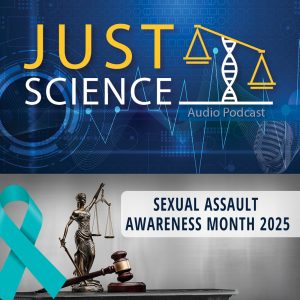
April is Sexual Assault Awareness Month; a national campaign which aims to support sexual assault survivors while also highlighting innovations in sexual assault response and prevention. In honor of Sexual Assault Awareness month, Just Science host and forensic scientist, Mikalaa Martin, sat down with several subject matter experts to discuss innovative methods for sexual assault evidence processing and workflows.
This episode is funded by the National Institute of Justice’s Forensic Technology Center of Excellence (Award No. 15PNIJ-21-GK-02192-MUMU).
Some content in this podcast may be considered sensitive and may evoke emotional responses or may not be appropriate for younger audiences.
Listen to all podcast episodes here: Apple Podcasts, Stitcher, Soundcloud, Spotify, & YouTube Podcasts!
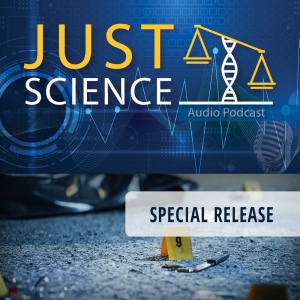
In this special release episode, Just Science sat down with Chuck Heurich, Senior Physical Scientist with the National Institute of Justice (NIJ), and Dr. Jennifer Snippen, experienced medicolegal death investigator and consultant, to discuss recent updates to NIJ’s Guide for the Death Scene Investigator.
Twenty-five years ago, NIJ released a guide to help medicolegal death investigators navigate complex scenes and cases; a document that has since evolved with the development of best practices and technological advancements. In 2024, a new version was released after a multi-disciplinary group of experts collaborated to make four major changes, including updates to documentation for death notifications to the office, procedures for child death investigations, partnering with law enforcement, and more. Listen along as Chuck and Dr. Snippen describe why the Death Investigation Guide was developed, how the newest updates came to be, and implications for day-to-day operations for medicolegal death investigators.
This episode is funded by the National Institute of Justice’s Forensic Technology Center of Excellence (Award No. 15PNIJ-21-GK-02192-MUMU).
Some content in this podcast may be considered sensitive and may evoke emotional responses or may not be appropriate for younger audiences.
Listen to all podcast episodes here: Apple Podcasts, Stitcher, Soundcloud, Spotify, & YouTube Podcasts!
2024 Seasons & Special Release Episodes
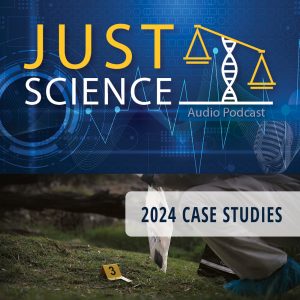 Through discussing and reflecting on real-world case examples, we are able to better understand the capabilities and limitations of forensic technologies and processes. In this year’s Case Studies season, host Mikalaa Martin sits down with forensic science practitioners, representing expertise in a diverse set of forensic disciplines, to discuss their presentations from the 2024 International Association for Identification Forensic Educational Conference. With topics ranging from inadvertently photographed ridge detail to mass disaster response and more, listen along as guests share their lessons learned through case examples and describe how they are utilizing both emerging and established methodologies and technologies to more effectively resolve cases and respond to catastrophes.
Through discussing and reflecting on real-world case examples, we are able to better understand the capabilities and limitations of forensic technologies and processes. In this year’s Case Studies season, host Mikalaa Martin sits down with forensic science practitioners, representing expertise in a diverse set of forensic disciplines, to discuss their presentations from the 2024 International Association for Identification Forensic Educational Conference. With topics ranging from inadvertently photographed ridge detail to mass disaster response and more, listen along as guests share their lessons learned through case examples and describe how they are utilizing both emerging and established methodologies and technologies to more effectively resolve cases and respond to catastrophes.
This season is funded by the National Institute of Justice’s Forensic Technology Center of Excellence (Award No. 15PNIJ-21-GK-02192-MUMU).
Listen to all podcast episodes here: Apple Podcasts, Stitcher, Soundcloud, Spotify, & YouTube Podcasts!
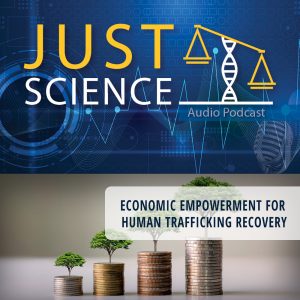 This season of Just Science highlights the strategies to support the economic empowerment of people who have experienced human trafficking. Economic abuse is inherent to the experience of human trafficking and often leaves survivors with many financial needs to be addressed. Access to financial support, professional development, and safe and sustainable employment are often cited as top needs among those seeking support. Throughout this season, members of the Human Trafficking Policy and Research Analyses Project sit down with experts in the anti-trafficking field to discuss the emergence of a wide range of economic empowerment programs. Episodes will cover core concepts in economic empowerment as they relate to human trafficking, and practical implementation of potential solutions including job training, career development, and direct financial assistance programs.
This season of Just Science highlights the strategies to support the economic empowerment of people who have experienced human trafficking. Economic abuse is inherent to the experience of human trafficking and often leaves survivors with many financial needs to be addressed. Access to financial support, professional development, and safe and sustainable employment are often cited as top needs among those seeking support. Throughout this season, members of the Human Trafficking Policy and Research Analyses Project sit down with experts in the anti-trafficking field to discuss the emergence of a wide range of economic empowerment programs. Episodes will cover core concepts in economic empowerment as they relate to human trafficking, and practical implementation of potential solutions including job training, career development, and direct financial assistance programs.
This season is funded by the Human Trafficking Policy and Research Analyses Project (Contract Number: HHSP233201500039I). The views expressed in these podcasts belong to the participants and do not necessarily reflect the views or policies of the Office of Planning, Research, and Evaluation, the Administration for Children and Families, or the U.S. Department of Health and Human Services.
Listen to all podcast episodes here: Apple Podcasts, Stitcher, Soundcloud, Spotify, & YouTube Podcasts!
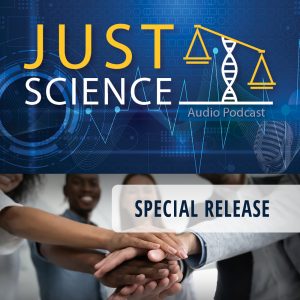 In this special release episode, Just Science sat down with Dr. Pattie Melton, Co-Director of the Bureau of Justice Assistance’s (BJA) Forensics Training and Technical Assistance, or TTA, Program, and Paige Presler-Jur, Associate Project Director for State-based Awards TTA team on BJA’s Comprehensive Opioid, Stimulant, and Substance Use (COSSUP) Program and the COSSUP Post-arrest, Pretrial, Defense Counsel, and Courts TTA team, to discuss the importance of TTA – a component of many federal grant programs that helps grant recipients meet their goals and improve program outcomes.
In this special release episode, Just Science sat down with Dr. Pattie Melton, Co-Director of the Bureau of Justice Assistance’s (BJA) Forensics Training and Technical Assistance, or TTA, Program, and Paige Presler-Jur, Associate Project Director for State-based Awards TTA team on BJA’s Comprehensive Opioid, Stimulant, and Substance Use (COSSUP) Program and the COSSUP Post-arrest, Pretrial, Defense Counsel, and Courts TTA team, to discuss the importance of TTA – a component of many federal grant programs that helps grant recipients meet their goals and improve program outcomes.
When an agency receives a federal grant, they may be faced with a myriad of challenges including setting scalable goals, tracking important program metrics, and planning for sustainability. As a result, training and technical assistance is built into many federal grant programs, so that experts from a separate organization can provide resources and support grant recipients throughout their period of performance. Listen along as Dr. Melton and Paige describe the strategies that TTA providers use when working with grant recipients, the importance of tailoring TTA to meet the unique needs of a community, and how TTA enhances the impact of important federally funded projects.
This episode is funded by RTI International’s Justice Practice Area.
Listen to all podcast episodes here: Apple Podcasts, Stitcher, Soundcloud, Spotify, & YouTube Podcasts!
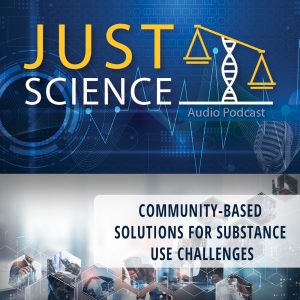 In this season of Just Science, the Forensic Technology Center of Excellence (FTCOE) and the Comprehensive Opioid, Stimulant, and Substance Use Program (COSSUP) collaborate to provide highlights and experiences on evidence-based research and programs that address substance use and overdoses in the United States. Throughout the season, host and Forensic Scientist Dr. Lawrance Mullen speaks with grantees about a diverse range of state and local projects, which incorporate reentry services for those being released from prison, peer support, crisis response, and more. Episodes also discuss innovative research for drug monitoring programs through wastewater drug epidemiology, overdose data, and drug checking and related technology implementations. Listeners will hear about lessons learned, exciting successes, and advice for other agencies who want to implement similar programs.
In this season of Just Science, the Forensic Technology Center of Excellence (FTCOE) and the Comprehensive Opioid, Stimulant, and Substance Use Program (COSSUP) collaborate to provide highlights and experiences on evidence-based research and programs that address substance use and overdoses in the United States. Throughout the season, host and Forensic Scientist Dr. Lawrance Mullen speaks with grantees about a diverse range of state and local projects, which incorporate reentry services for those being released from prison, peer support, crisis response, and more. Episodes also discuss innovative research for drug monitoring programs through wastewater drug epidemiology, overdose data, and drug checking and related technology implementations. Listeners will hear about lessons learned, exciting successes, and advice for other agencies who want to implement similar programs.
This Just Science season is supported, in part, by RTI Award No. 15PNIJ-21-GK-02192-MUMU, awarded by the National Institute of Justice, and by RTI Award No. 15PBJA-23-GK-02250-COAP, awarded by the Bureau of Justice Assistance. Both are agencies within the Office of Justice Programs, U.S. Department of Justice. The opinions, findings, and conclusions or recommendations expressed in this podcast season do not necessarily reflect those of the Department of Justice.
Listen to all podcast episodes here: Apple Podcasts, Stitcher, Soundcloud, Spotify, & YouTube Podcasts!
 When a community member requires emergency services during a mental health or substance use crisis, they may benefit from a range of additional or alternative services in conjunction with a traditional law enforcement response. To understand the impact of these alternative responses, public safety and treatment practitioners in Indianapolis collaborated with researchers to pilot a co-response mobile crisis assistance team program, where a mental health clinician is partnered with a police officer for response to any behavioral health related emergency calls. Listen along as Assistant Chief Cummings and Ms. Cianelli describe how providing immediate mental health services and follow-up care can benefit community members while also providing support to police on-scene, helpful advice for practitioners who may want to implement co-response teams, and the importance of partnering with researchers to effectively evaluate these types of programs.
When a community member requires emergency services during a mental health or substance use crisis, they may benefit from a range of additional or alternative services in conjunction with a traditional law enforcement response. To understand the impact of these alternative responses, public safety and treatment practitioners in Indianapolis collaborated with researchers to pilot a co-response mobile crisis assistance team program, where a mental health clinician is partnered with a police officer for response to any behavioral health related emergency calls. Listen along as Assistant Chief Cummings and Ms. Cianelli describe how providing immediate mental health services and follow-up care can benefit community members while also providing support to police on-scene, helpful advice for practitioners who may want to implement co-response teams, and the importance of partnering with researchers to effectively evaluate these types of programs.
To evaluate the Indianapolis co-response program, a randomized controlled study of 911 calls for service was utilized to help ensure that any positive or negative outcomes were a direct result of the program rather than other factors. When conducted outside of a laboratory setting, this type of study requires extensive planning, coordination, and trust-building between researchers and practitioners. Listen along as Dr. Lowder, Dr. Grommon, and Dr. Ray describe the moving parts that facilitate real-world randomized controlled trials, the importance of directly comparing outcomes from co-response cases to outcomes from traditional policing cases, and the results from the Indianapolis co-response program evaluation.
These special release episodes are funded in part by RTI International’s Justice Practice Area and the Mobile Crisis Assistance Team program supported by Arnold Ventures.
Some content in this podcast may be considered sensitive and may evoke emotional responses or may not be appropriate for younger audiences.
Listen to all podcast episodes here: Apple Podcasts, Stitcher, Soundcloud, Spotify, & YouTube Podcasts!
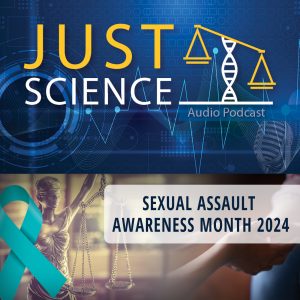 April is Sexual Assault Awareness Month; a national campaign which aims to support sexual assault survivors while also highlighting innovations in sexual assault response and prevention. In honor of Sexual Assault Awareness month, Just Science host and forensic social scientist, Jason Chute, sat down with several subject matter experts to discuss sexual assault evidence collection, cold case investigation, and survivor advocacy. Listen along as our guests provide valuable insight into the field of sexual assault response and discuss the importance of taking a trauma-informed approach.
April is Sexual Assault Awareness Month; a national campaign which aims to support sexual assault survivors while also highlighting innovations in sexual assault response and prevention. In honor of Sexual Assault Awareness month, Just Science host and forensic social scientist, Jason Chute, sat down with several subject matter experts to discuss sexual assault evidence collection, cold case investigation, and survivor advocacy. Listen along as our guests provide valuable insight into the field of sexual assault response and discuss the importance of taking a trauma-informed approach.
These special release episodes are funded by the National Institute of Justice’s Forensic Technology Center of Excellence.
Some content in this podcast may be considered sensitive and may evoke emotional responses or may not be appropriate for younger audiences.
Listen to all podcast episodes here: Apple Podcasts, Stitcher, Soundcloud, Spotify, & YouTube Podcasts!
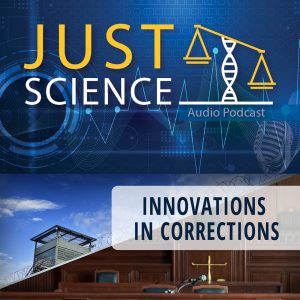
The scope and reach of corrections in the United States is considerable, and many pressing challenges are faced by local, state, and federal correctional systems, policymakers, and the people and communities directly impacted by these systems. Considering the complexity of correctional systems, the need to improve institutional policies and practices, effective reentry strategies, and integration of supportive technology has never been greater. To inform these changes, it is crucial that researchers collaborate with justice-involved individuals and those with lived experience to gain valuable expertise throughout the research process. Tune in this season as Peyton Scalise, Research Public Health Analyst at RTI International, sits down with her colleagues to discuss recent research and technological innovations that assist those involved in the correctional system, and best research practices that are being developed in the field.
This season is funded by RTI International’s Justice Practice Area.
Some content in this podcast may be considered sensitive and may evoke emotional responses or may not be appropriate for younger audiences.
Listen to all podcast episodes here: Apple Podcasts, Stitcher, Soundcloud, Spotify, & YouTube Podcasts!
 RTI’s security threats and extremism staff have a robust and growing portfolio of work focused on developing, implementing, and evaluating targeted violence and terrorism prevention strategies, as well as work focused on programming for active or former extremists. This includes evaluations of federally funded targeted violence and terrorism prevention grant projects, an assessment of available prevention programming resources, and a mixed-methods, longitudinal study examining the processes by which individuals disengage from white nationalist groups. Tune in this season as Dr. Michael Planty sits down with his colleagues to discuss the country’s most pressing security threats and how researchers, practitioners, and their federal partners are responding.
RTI’s security threats and extremism staff have a robust and growing portfolio of work focused on developing, implementing, and evaluating targeted violence and terrorism prevention strategies, as well as work focused on programming for active or former extremists. This includes evaluations of federally funded targeted violence and terrorism prevention grant projects, an assessment of available prevention programming resources, and a mixed-methods, longitudinal study examining the processes by which individuals disengage from white nationalist groups. Tune in this season as Dr. Michael Planty sits down with his colleagues to discuss the country’s most pressing security threats and how researchers, practitioners, and their federal partners are responding.
This season is funded by RTI International’s Justice Practice Area.
Some content in this podcast may be considered sensitive and may evoke emotional responses or may not be appropriate for younger audiences.
Listen to all podcast episodes here: Apple Podcasts, Stitcher, Soundcloud, Spotify, & YouTube Podcasts!
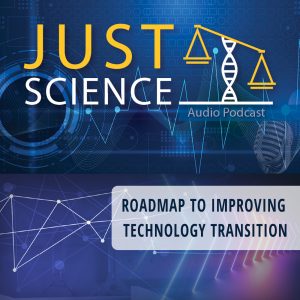
The National Institute of Justice’s Forensic Laboratory Needs Technology Working Group, or FLN–TWG, brings together a diverse group of forensic researchers and practitioners to advise, assess, and exchange information about the technology needs of state and local forensic laboratories. One of the largest challenges faced by these laboratories is transitioning new research and technology innovations into real-world laboratory practice. As a result, a FLN–TWG subcommittee has developed a roadmap report, which provides actionable guidance to improving the research, development, testing, evaluation, and implementation of new forensic research products into the forensic laboratory. In this season, innovation advisor and roadmap author Rebecca Shute speaks with the co-authors of the roadmap who are on the FLN-TWG research subcommittee to discuss the culture of the forensic science community, the need for guidance, and the lessons learned along the way.
This season was funded by the National Institute of Justice’s Forensic Technology Center of Excellence (Award No. 15PNIJ-21-GK-02192-MUMU).
Listen to all podcast episodes here: Apple Podcasts, Stitcher, Soundcloud, Spotify, & YouTube Podcasts!
2023 Seasons & Special Release Episodes
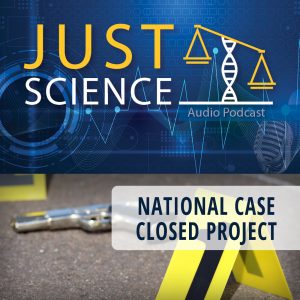 In many cities across the county, the number of violent crimes is increasing while law enforcement agencies are facing widespread staffing shortages and other organizational challenges. To help address these issues, the Bureau of Justice Assistance has funded the National Case Closed Project, a nationwide program designed to support law enforcement agencies in improving their violent crime clearance rates, with an emphasis on fatal and nonfatal shooting cases. The project team actively partners with law enforcement agencies to identify effective and sustainable practices related to agency operations, agency resources, investigator capabilities, and community relations. In this season, we will discuss the National Case Closed project and recommendations from top law enforcement personnel, prosecutors, crime analysts, and community groups for collaborating on efforts to improve case outcomes.
In many cities across the county, the number of violent crimes is increasing while law enforcement agencies are facing widespread staffing shortages and other organizational challenges. To help address these issues, the Bureau of Justice Assistance has funded the National Case Closed Project, a nationwide program designed to support law enforcement agencies in improving their violent crime clearance rates, with an emphasis on fatal and nonfatal shooting cases. The project team actively partners with law enforcement agencies to identify effective and sustainable practices related to agency operations, agency resources, investigator capabilities, and community relations. In this season, we will discuss the National Case Closed project and recommendations from top law enforcement personnel, prosecutors, crime analysts, and community groups for collaborating on efforts to improve case outcomes.
This season was funded by the U.S. Department of Justice Bureau of Justice Assistance (Award No. 15PBJA-21-GK-04008-JAG).
This project is supported by Grant No. 15PBJA-21-GK-04008-JAGP awarded by the Bureau of Justice Assistance. The Bureau of Justice Assistance is a component of the U.S. Department of Justice’s Office of Justice Programs, which also includes the Bureau of Justice Statistics, the National Institute of Justice, the Office of Juvenile Justice and Delinquency Prevention, the Office for Victims of Crime, and the Office of Sex Offender Sentencing, Monitoring, Apprehending, Registering, and Tracking. Points of view or opinions in this document are those of the author and do not necessarily represent the official position or policies of the U.S. Department of Justice.
Listen to all podcast episodes here: Apple Podcasts, Stitcher, Soundcloud, Spotify, & Google Podcasts!
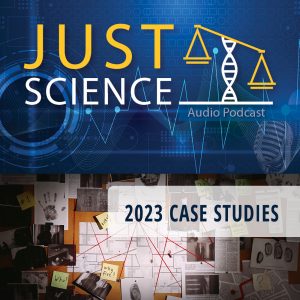 Reviewing case studies is an important way to better understand forensic and criminal legal practices in the context of real-world events. While new cases arise every day, each has their own unique details, nuances, and lessons to be learned. In this year’s Case Studies season, host Jaclynn McKay sits down with several diverse and experienced practitioners at the 2023 International Association for Identification Forensic Educational Conference to hear about how they are applying forensic technologies to their casework and discuss lessons learned from their career defining cases. Listen along as guests discuss how they are applying new methodologies to better resolve cases, building internal databases to generate forensic leads, exploring the use of current forensic technologies in new ways, and much more!
Reviewing case studies is an important way to better understand forensic and criminal legal practices in the context of real-world events. While new cases arise every day, each has their own unique details, nuances, and lessons to be learned. In this year’s Case Studies season, host Jaclynn McKay sits down with several diverse and experienced practitioners at the 2023 International Association for Identification Forensic Educational Conference to hear about how they are applying forensic technologies to their casework and discuss lessons learned from their career defining cases. Listen along as guests discuss how they are applying new methodologies to better resolve cases, building internal databases to generate forensic leads, exploring the use of current forensic technologies in new ways, and much more!
This season was funded by the National Institute of Justice’s Forensic Technology Center of Excellence (Award No. 15PNIJ-21-GK-02192-MUMU).
Listen to all podcast episodes here: Apple Podcasts, Stitcher, Soundcloud, Spotify, & Google Podcasts!
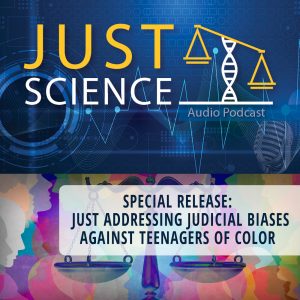 In this special release episode, Just Science sat down with Kristin Henning, Director of the Juvenile Justice Clinic and Initiative at Georgetown Law and Author of The Rage of Innocence: How America Criminalizes Black Youth, to discuss the biases that exist in the American criminal legal system, which disproportionally and negatively impact teenagers of color.
In this special release episode, Just Science sat down with Kristin Henning, Director of the Juvenile Justice Clinic and Initiative at Georgetown Law and Author of The Rage of Innocence: How America Criminalizes Black Youth, to discuss the biases that exist in the American criminal legal system, which disproportionally and negatively impact teenagers of color.
Decades of developmental psychology research supports that adolescence is a period marked by risk-taking behaviors, experimentation, and susceptibility to peer influence. While these features of adolescence are normal for all teenagers, teenagers of color are disproportionately punished by the American criminal legal system for behaviors that are developmentally appropriate. Listen along as Professor Henning describes what typical adolescent behavior looks like, the depiction of adolescence and race in the media, and the movement to better inform criminal legal system practitioners about this unique developmental period.
This episode is funded by RTI International’s Transformative Research Unit for Equity and the Justice Practice Area.
Listen to all podcast episodes here: Apple Podcasts, Stitcher, Soundcloud, Spotify, & Google Podcasts!
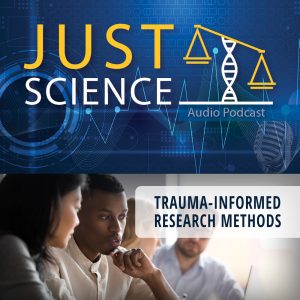
In this special release episode, Just Science sat down with Patricia Powers, an attorney advisor with AEquitas, to discuss her experience working on the Enhancing Conviction Integrity through Forensics training series, as a part of the Bureau of Justice Assistance Sexual Assault Kit Initiative.
The Enhancing Conviction Integrity through Forensics training series aims to identify and develop resources that help prosecutors and other professionals effectively prepare sexual assault cases for trial and bring a victim’s voice to the courtroom. Specifically, utilizing forensic technology and forensic evidence can be important for advancing justice in a sexual assault case. Listen along as Patti describes some of the innovative tools that have been developed through this training series, her experience taking a multidisciplinary approach to training, and the importance of trauma-informed trial preparation.
This episode is funded by the Bureau of Justice Assistance (Grant No. 2019-MU-BX-K011). This project was supported by Grant No. 2019-MU-BX-K011 awarded by the Bureau of Justice Assistance. The Bureau of Justice Assistance is a component of the U.S. Department of Justice’s Office of Justice Programs, which also includes the Bureau of Justice Statistics, the National Institute of Justice, the Office of Juvenile Justice and Delinquency Prevention, the Office for Victims of Crime, and the SMART Office. Points of view or opinions in this document are those of the author and do not necessarily represent the official position or policies of the U.S. Department of Justice.
Listen to all podcast episodes here: Apple Podcasts, Stitcher, Soundcloud, Spotify, & Google Podcasts!
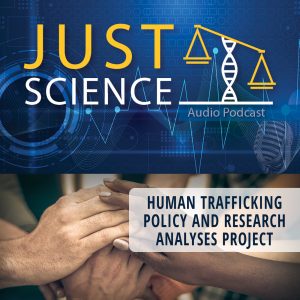 Human trafficking has far-reaching consequences that not only impact individuals but also families and entire communities. As a result, combatting human trafficking demands a comprehensive and collaborative approach which may span multiple disciplines. Many questions still remain about the most effective ways to prevent and respond to human trafficking. To help address this need, RTI’s Human Trafficking Policy and Research Analyses Project (HTPRAP), conducted in partnership with the Administration for Children and Families’ Office of Planning, Research, and Evaluation and the Office on Trafficking in Persons, aims to advance the scope of knowledge and data around human trafficking by identifying priority areas for learning and conducting a series of studies that can immediately impact practice. This season, we sit down with many HTPRAP contributors to learn about the successes, challenges, and future work of human trafficking research.
Human trafficking has far-reaching consequences that not only impact individuals but also families and entire communities. As a result, combatting human trafficking demands a comprehensive and collaborative approach which may span multiple disciplines. Many questions still remain about the most effective ways to prevent and respond to human trafficking. To help address this need, RTI’s Human Trafficking Policy and Research Analyses Project (HTPRAP), conducted in partnership with the Administration for Children and Families’ Office of Planning, Research, and Evaluation and the Office on Trafficking in Persons, aims to advance the scope of knowledge and data around human trafficking by identifying priority areas for learning and conducting a series of studies that can immediately impact practice. This season, we sit down with many HTPRAP contributors to learn about the successes, challenges, and future work of human trafficking research.
This season is funded by the Human Trafficking Policy and Research Analyses Project (Contract Number: HHSP233201500039I).
Listen to all podcast episodes here: Apple Podcasts, Stitcher, Soundcloud, Spotify, & Google Podcasts!
 Trauma-informed care extends beyond mental health services to various other sectors such as corrections, homeless services, child welfare, and schools. It can also be applied in the field of research, guiding decision-making and organizational structure which benefits both participants and researchers. A trauma-informed approach should be prioritized in research projects to address the impact of traumatic stress on mental and physical health. This involves creating safe environments and setting up study procedures that seek to avoid re-traumatizing participants. Just Science explores how experts apply this approach throughout the research process from project management to data collection and dissemination, revolutionizing organizations and promoting safety and support for all.
Trauma-informed care extends beyond mental health services to various other sectors such as corrections, homeless services, child welfare, and schools. It can also be applied in the field of research, guiding decision-making and organizational structure which benefits both participants and researchers. A trauma-informed approach should be prioritized in research projects to address the impact of traumatic stress on mental and physical health. This involves creating safe environments and setting up study procedures that seek to avoid re-traumatizing participants. Just Science explores how experts apply this approach throughout the research process from project management to data collection and dissemination, revolutionizing organizations and promoting safety and support for all.
This season is funded by the RTI International Justice Practice Area.
Listen to all podcast episodes here: Apple Podcasts, Stitcher, Soundcloud, Spotify, & Google Podcasts!
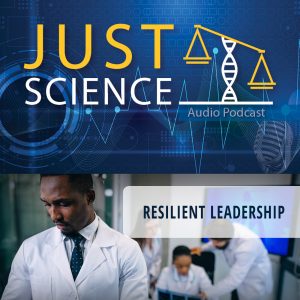 Each year, the American Society of Crime Laboratory Directors (ASCLD) Symposium convenes a diverse group of forensic science practitioners from around the country in one place where they can discuss their challenges, successes, and shared experiences. This year’s symposium was held in Austin, Texas, where the theme was Resilient Leadership. The Forensic Technology Center of Excellence recorded on-site in the hopes of bringing a bit of this year’s symposium magic to you. Listen along as Just Science sits down with attendees and speakers at the 2023 ASCLD Symposium to discuss the importance of resilient leadership in forensic science, especially following the worst global pandemic in the past hundred years.
Each year, the American Society of Crime Laboratory Directors (ASCLD) Symposium convenes a diverse group of forensic science practitioners from around the country in one place where they can discuss their challenges, successes, and shared experiences. This year’s symposium was held in Austin, Texas, where the theme was Resilient Leadership. The Forensic Technology Center of Excellence recorded on-site in the hopes of bringing a bit of this year’s symposium magic to you. Listen along as Just Science sits down with attendees and speakers at the 2023 ASCLD Symposium to discuss the importance of resilient leadership in forensic science, especially following the worst global pandemic in the past hundred years.
This season is funded in part by the National Institute of Justice’s Forensic Technology Center of Excellence (Award No. 15PNIJ-21-GK-02192-MUMU) and RTI International’s Justice Practice Area.
Listen to all podcast episodes here: Apple Podcasts, Stitcher, Soundcloud, Spotify, & Google Podcasts!
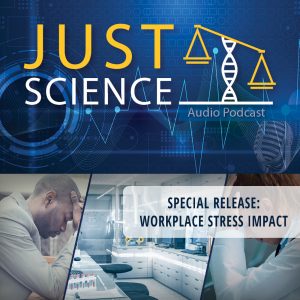 In this Special Release episode, Just Science sat down with Dr. Mohammed Almazrouei, a forensic practitioner with the Abu Dhabi Police, to discuss his dissertation work, which examines how workplace stressors may affect decision-making in the field of forensic science. Listen along as Dr. Almazrouei highlights some of the most salient workplace stressors in forensic science, how those stressors affect decision-making, and how he has laid the foundation for future research on this topic.
In this Special Release episode, Just Science sat down with Dr. Mohammed Almazrouei, a forensic practitioner with the Abu Dhabi Police, to discuss his dissertation work, which examines how workplace stressors may affect decision-making in the field of forensic science. Listen along as Dr. Almazrouei highlights some of the most salient workplace stressors in forensic science, how those stressors affect decision-making, and how he has laid the foundation for future research on this topic.
This episode of Just Science is funded by the National Institute of Justice’s Forensic Technology Center of Excellence (Award #: 15PNIJ-21-GK-02192-MUMU).
Listen to all podcast episodes here: Apple Podcasts, Stitcher, Soundcloud, Spotify, & Google Podcasts!
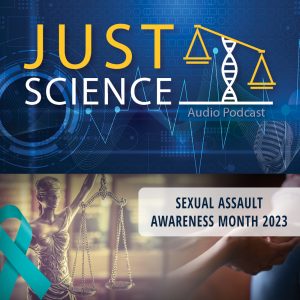 April is Sexual Assault Awareness Month; a campaign designed to raise awareness for and provide methods to prevent sexual violence. In honor of Sexual Assault Awareness month, Just Science sat down with several experts whose research and career experience encompass a wide range of topics related to sexual assault cases. From conducting research on sexual violence to prosecuting assailants and caring for survivors, listen along as our guests provide invaluable insight into the ever-evolving field of sexual assault response reform.
April is Sexual Assault Awareness Month; a campaign designed to raise awareness for and provide methods to prevent sexual violence. In honor of Sexual Assault Awareness month, Just Science sat down with several experts whose research and career experience encompass a wide range of topics related to sexual assault cases. From conducting research on sexual violence to prosecuting assailants and caring for survivors, listen along as our guests provide invaluable insight into the ever-evolving field of sexual assault response reform.
This season of Just Science is funded by the National Institute of Justice’s Forensic Technology Center of Excellence (Award #: 15PNIJ-21-GK-02192-MUMU).
Listen to all podcast episodes here: Apple Podcasts, Stitcher, Soundcloud, Spotify, & Google Podcasts!
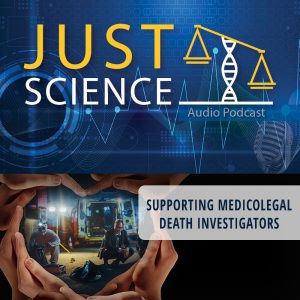 When someone dies unexpectedly or of unnatural causes, their death will likely be subject to a medicolegal death investigation to determine the cause and manner of death, identification of the decedent, and circumstances surrounding the death. This community is made up of forensic pathologists, medical examiners, coroners, autopsy technicians, forensic anthropologists, and more. These professionals ensure deaths are thoroughly investigated, while ensuring respect and dignity for the decedents and their families after what is likely one of the most traumatic experiences of their lives. Our host for this mini season, Kelly Keyes, has over 20 years of experience as a medicolegal death investigator in a large coroner’s office. Listen along as Kelly interviews guests to learn more about how to get started in the field of medicolegal death investigation and some of the many roles that are involved in this community.
When someone dies unexpectedly or of unnatural causes, their death will likely be subject to a medicolegal death investigation to determine the cause and manner of death, identification of the decedent, and circumstances surrounding the death. This community is made up of forensic pathologists, medical examiners, coroners, autopsy technicians, forensic anthropologists, and more. These professionals ensure deaths are thoroughly investigated, while ensuring respect and dignity for the decedents and their families after what is likely one of the most traumatic experiences of their lives. Our host for this mini season, Kelly Keyes, has over 20 years of experience as a medicolegal death investigator in a large coroner’s office. Listen along as Kelly interviews guests to learn more about how to get started in the field of medicolegal death investigation and some of the many roles that are involved in this community.
This season of Just Science is funded by the National Institute of Justice’s Forensic Technology Center of Excellence (Award #: 15PNIJ-21-GK-02192-MUMU).
Listen to all podcast episodes here: Apple Podcasts, Stitcher, Soundcloud, Spotify, & Google Podcasts!
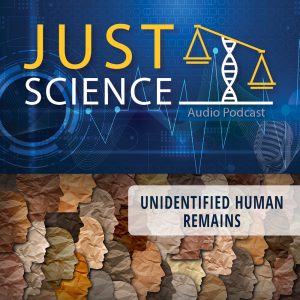 In cases where a decedent’s identity is unknown, forensic scientists can utilize a range of identification methods in order to give a victim their name back and bring closure to their families. However, access to these important resources may vary across communities. In the Unidentified Human Remains mini season, we sit down with experts who explain how teeth, DNA samples, and more can contribute to identifying unknown human remains. Tune in as we discuss specific cases where identification methods are utilized, the future of human identification technology, and much more.
In cases where a decedent’s identity is unknown, forensic scientists can utilize a range of identification methods in order to give a victim their name back and bring closure to their families. However, access to these important resources may vary across communities. In the Unidentified Human Remains mini season, we sit down with experts who explain how teeth, DNA samples, and more can contribute to identifying unknown human remains. Tune in as we discuss specific cases where identification methods are utilized, the future of human identification technology, and much more.
This season of Just Science is funded by the National Institute of Justice’s Forensic Technology Center of Excellence (Award #: 15PNIJ-21-GK-02192-MUMU).
Listen to all podcast episodes here: Apple Podcasts, Stitcher, Soundcloud, Spotify, & Google Podcasts!
2022 Seasons & Special Release Episodes
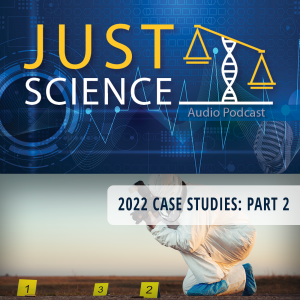 Case Studies are an important tool for providing insight and expanding knowledge into the criminal justice field. Hearing how scientific processes are applied to real-life cases can provide avenues for ingenuity, opportunities for learning, and ways to support other cases. In Part 2 of our Case Studies mini-season, listen along as our guests recount their experiences using autopsy information for crime scene reconstruction, using forensic services to help solve cold cases, identifying unknown victims, and more!
Case Studies are an important tool for providing insight and expanding knowledge into the criminal justice field. Hearing how scientific processes are applied to real-life cases can provide avenues for ingenuity, opportunities for learning, and ways to support other cases. In Part 2 of our Case Studies mini-season, listen along as our guests recount their experiences using autopsy information for crime scene reconstruction, using forensic services to help solve cold cases, identifying unknown victims, and more!
This season is funded by the National Institute of Justice’s Forensic Technology Center of Excellence (Award No. 15PNIJ-21-GK-02192-MUMU).
Listen to all podcast episodes here: Apple Podcasts, Stitcher, Soundcloud, Spotify, & Google Podcasts!
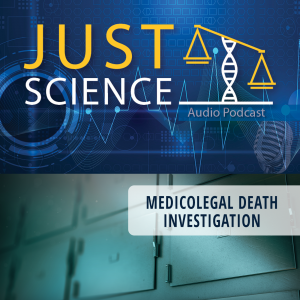 Over the past few years RTI International, the Association of State and Territorial Health Officials, and the Centers for Disease Control and Prevention have been working on understanding the main stressors which impact medicolegal death investigation or MDI professionals. One of the top stressors burdening the community was a lack of understanding from political stakeholders and community leaders. Listen along as Dr. Aurelius and Coroner McGinty discuss their firsthand experiences, funding gaps, and efforts to tackle this complex topic.
Over the past few years RTI International, the Association of State and Territorial Health Officials, and the Centers for Disease Control and Prevention have been working on understanding the main stressors which impact medicolegal death investigation or MDI professionals. One of the top stressors burdening the community was a lack of understanding from political stakeholders and community leaders. Listen along as Dr. Aurelius and Coroner McGinty discuss their firsthand experiences, funding gaps, and efforts to tackle this complex topic.
This episode is funded by the Association of State and Territorial Health Officials in collaboration with the Centers for Disease Control and Prevention.
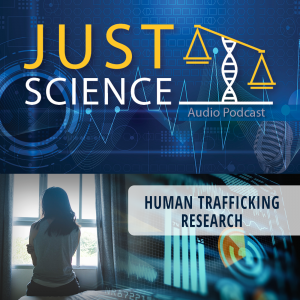 Human trafficking, which is comprised of both sex and labor trafficking, is commonly understood to be a widespread global issue; however, there is still a lot that we don’t know. Human trafficking can look vastly different depending on the local community context in which it occurs, in terms of prevalence, type of exploitation, and survivor outcomes. Understanding these community-level differences is crucial when considering the appropriate response by policymakers, service-providers, healthcare providers, and law enforcement. Listen along as our guests describe their multi-pronged approach to human trafficking research, which helps to better meet the needs of survivors and their communities.
Human trafficking, which is comprised of both sex and labor trafficking, is commonly understood to be a widespread global issue; however, there is still a lot that we don’t know. Human trafficking can look vastly different depending on the local community context in which it occurs, in terms of prevalence, type of exploitation, and survivor outcomes. Understanding these community-level differences is crucial when considering the appropriate response by policymakers, service-providers, healthcare providers, and law enforcement. Listen along as our guests describe their multi-pronged approach to human trafficking research, which helps to better meet the needs of survivors and their communities.
This season of Just Science is funded by RTI International’s Justice Practice Area.
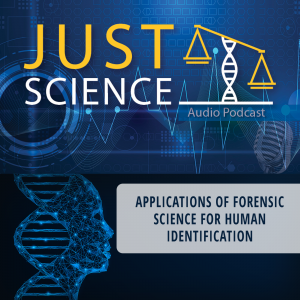 Identifying unknown human remains requires the strategic use of investigative techniques and scientific methods. This includes utilizing various forensic methods to gather the decedent’s biometrics, collecting familial reference samples for comparison, and inputting available information into comprehensive databases to facilitate connections to cases nationwide and internationally. These efforts can help bring closure to families, identify victims of mass disasters, and find missing persons. Listen along as our guests detail techniques for human identification including forensic genetic genealogy, postmortem fingerprinting, forensic anthropology, and forensic art, as well as the application of comprehensive databases to casework.
Identifying unknown human remains requires the strategic use of investigative techniques and scientific methods. This includes utilizing various forensic methods to gather the decedent’s biometrics, collecting familial reference samples for comparison, and inputting available information into comprehensive databases to facilitate connections to cases nationwide and internationally. These efforts can help bring closure to families, identify victims of mass disasters, and find missing persons. Listen along as our guests detail techniques for human identification including forensic genetic genealogy, postmortem fingerprinting, forensic anthropology, and forensic art, as well as the application of comprehensive databases to casework.
This season is funded by the National Institute of Justice’s Forensic Technology Center of Excellence (Award No. 15PNIJ-21-GK-02192-MUMU).
Listen to all podcast episodes here: Apple Podcasts, Stitcher, Soundcloud, Spotify, & Google Podcasts!
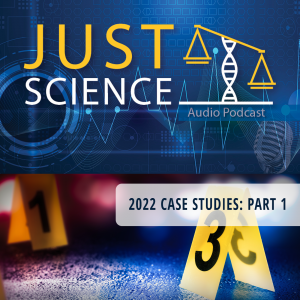
Case studies generate in-depth, multi-faceted understanding of complex issues in real-life contexts. As the criminal justice landscape continues to evolve, practitioners see and experience new and different cases every day. No two cases are alike and though it would be impossible to learn from all of them, this special Case Studies mini-season provides something for everyone. Listen in as our guests share tales of curious latent print evidence, a Sin City hit-and-run, forensic archeology in “no-body” homicides, an elusive serial rapist in the South, and more!
This season is funded by the National Institute of Justice’s Forensic Technology Center of Excellence (Award No. 15PNIJ-21-GK-02192-MUMU).
Listen to all podcast episodes here: Apple Podcasts, Stitcher, Soundcloud, Spotify, & Google Podcasts!
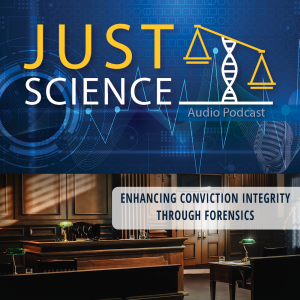
The Enhancing Conviction Integrity through Forensics training series delivers forensic-based training in an effort to ensure prosecutors and defense counsel trying violent crime cases, including cold cases and death penalty cases, have the knowledge and tools to effectively understand and present forensic evidence in court. The training seeks to ensure the integrity of the conviction and prevent wrongful convictions related to forensic evidence. Just Science sat down with several subject matter experts during this season to dive deeper into the concept of Conviction Integrity and how practitioners can support justified outcomes in the legal system.
This project was supported by Grant No. 2019-MU-BX-K011 awarded by the Bureau of Justice Assistance. The Bureau of Justice Assistance is a component of the U.S. Department of Justice’s Office of Justice Programs, which also includes the Bureau of Justice Statistics, the National Institute of Justice, the Office of Juvenile Justice and Delinquency Prevention, the Office for Victims of Crime, and the SMART Office. Points of view or opinions in this document are those of the author and do not necessarily represent the official position or policies of the U.S. Department of Justice.
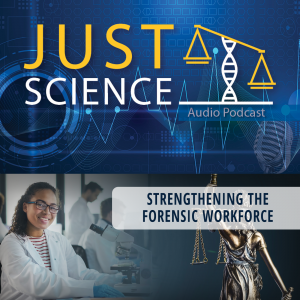 The Forensic Science Education Programs Accreditation Commission (FEPAC) was established by the American Academy of Forensic Sciences (AAFS) in 2004 to maintain and enhance the quality of forensic science education. FEPAC-accreditation is one way for students and hiring managers to recognize and distinguish high-quality undergraduate and graduate forensic science programs. In addition to FEPAC, university faculty and forensic practitioners also emphasize the importance of support from the National Institute of Justice (NIJ) for student research projects as they prepare for a career in forensic science. During this season of Just Science, we sat down with distinguished university faculty, FEPAC Commissioners, and forensic practitioners to shed light on the benefits of accreditation, student research, and NIJ involvement in collegiate programs. Our guests provide insight on their FEPAC-accredited programs across forensic disciplines and share advice for current students, professors, and forensic professionals.
The Forensic Science Education Programs Accreditation Commission (FEPAC) was established by the American Academy of Forensic Sciences (AAFS) in 2004 to maintain and enhance the quality of forensic science education. FEPAC-accreditation is one way for students and hiring managers to recognize and distinguish high-quality undergraduate and graduate forensic science programs. In addition to FEPAC, university faculty and forensic practitioners also emphasize the importance of support from the National Institute of Justice (NIJ) for student research projects as they prepare for a career in forensic science. During this season of Just Science, we sat down with distinguished university faculty, FEPAC Commissioners, and forensic practitioners to shed light on the benefits of accreditation, student research, and NIJ involvement in collegiate programs. Our guests provide insight on their FEPAC-accredited programs across forensic disciplines and share advice for current students, professors, and forensic professionals.
This season of Just Science is funded by the National Institute of Justice’s Forensic Technology Center of Excellence.
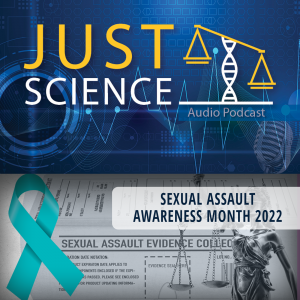 Sexual Assault Awareness Month is observed every April as a campaign to increase awareness about sexual harassment, assault, and abuse. In honor of this effort, Just Science sat down with multiple subject matter experts to discuss recent developments in sexual assault response reform. Listen along as our guests discuss the latest research associated with the prevalence of strangulation in sexual assault cases, understanding how to identify and document strangulation while supporting safety concerns for victims in these cases, supporting and effectively prosecuting sexual assault cases with male and transgender victims, supporting victims of non-reported and anonymous sexual assault kits, and much more in this season of Just Science.
Sexual Assault Awareness Month is observed every April as a campaign to increase awareness about sexual harassment, assault, and abuse. In honor of this effort, Just Science sat down with multiple subject matter experts to discuss recent developments in sexual assault response reform. Listen along as our guests discuss the latest research associated with the prevalence of strangulation in sexual assault cases, understanding how to identify and document strangulation while supporting safety concerns for victims in these cases, supporting and effectively prosecuting sexual assault cases with male and transgender victims, supporting victims of non-reported and anonymous sexual assault kits, and much more in this season of Just Science.
This season of Just Science is funded by the National Institute of Justice’s Forensic Technology Center of Excellence.
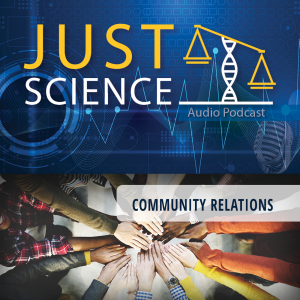 Just Science is excited to release our next mini season: Community Relations. This season dives deep into pressing issues of fairness and equity in the legal system. Tune in as experts and practitioners across a range of specializations discuss racial and socioeconomic disparities in the pretrial system, the impact of emerging technologies on police-community relationships, alternative responses to traditional law enforcement, and much more in this new season of Just Science.
Just Science is excited to release our next mini season: Community Relations. This season dives deep into pressing issues of fairness and equity in the legal system. Tune in as experts and practitioners across a range of specializations discuss racial and socioeconomic disparities in the pretrial system, the impact of emerging technologies on police-community relationships, alternative responses to traditional law enforcement, and much more in this new season of Just Science.
This season of Just Science is funded in part by RTI’s Applied Justice Research Division and other projects. Please view the individual episode pages for more information about episode funding.
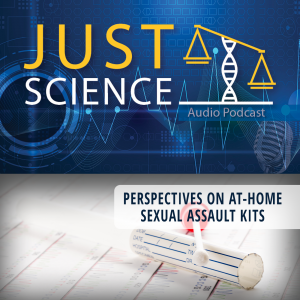 Just Science is excited to release our next season: Perspectives on At-Home Sexual Assault Kits. This season takes a closer look at DNA collection in sexual assault cases, with an emphasis on analyzing the efficacy of at-home sexual assault kits. In this new season of Just Science, tune in as we speak to a range of subject matter experts – all with varying perspectives on the topic – to discuss the role of at-home sexual assault kits when responding to sexual assault cases.
Just Science is excited to release our next season: Perspectives on At-Home Sexual Assault Kits. This season takes a closer look at DNA collection in sexual assault cases, with an emphasis on analyzing the efficacy of at-home sexual assault kits. In this new season of Just Science, tune in as we speak to a range of subject matter experts – all with varying perspectives on the topic – to discuss the role of at-home sexual assault kits when responding to sexual assault cases.
This season is funded by the National Institute of Justice’s Forensic Technology Center of Excellence.
2021 Seasons & Special Release Episodes
 Women are vastly underrepresented in the policing profession, accounting for only 12% of the police officers in the United States. Women police can increase legitimacy and trust within communities, and also improve department performance. Listen along as Dr. Jennifer Rineer and Maureen McGough discuss their research on this issue and the steps organizations are taking to increase women representation in policing in this episode of Just Science.
Women are vastly underrepresented in the policing profession, accounting for only 12% of the police officers in the United States. Women police can increase legitimacy and trust within communities, and also improve department performance. Listen along as Dr. Jennifer Rineer and Maureen McGough discuss their research on this issue and the steps organizations are taking to increase women representation in policing in this episode of Just Science.
This episode is funded by the NIJ project titled From Research to Reality: Recruiting More Women into the Policing Profession (Award 2019-R2-CX-0027).
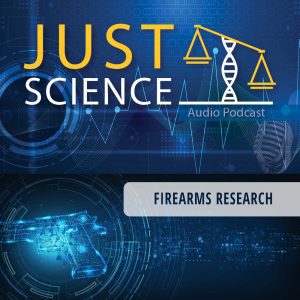 Just Science is excited to release our next mini season: Firearms Research. From addressing deadly mass shootings to ensuring school safety, this season takes a closer look at research seeking to make communities safer from gun violence. Tune in as our experts discuss investigating gun crimes, strategies aimed at combatting firearm violence in schools, and valuable resources for practitioners interested in firearms research in this new season of Just Science.
Just Science is excited to release our next mini season: Firearms Research. From addressing deadly mass shootings to ensuring school safety, this season takes a closer look at research seeking to make communities safer from gun violence. Tune in as our experts discuss investigating gun crimes, strategies aimed at combatting firearm violence in schools, and valuable resources for practitioners interested in firearms research in this new season of Just Science.
This season of Just Science is funded in part by RTI International’s Applied Justice Research Division and other projects. Please view the individual episode pages for more information about episode funding.
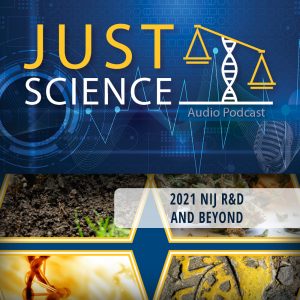 Despite being virtual, NIJ’s 2021 R&D Symposium was one of the most successful iterations of this meeting to date. With over 600 attendees across the globe, the audience was exceptionally diverse in terms of location and forensic discipline. In this Just Science mini-series, we sat down with the program managers of the four NIJ forensic portfolios to discuss the symposium and the future of their respective research areas. Listen along as our guests discuss research and emerging topics in various forensic disciplines, including seized drugs and toxicology; impression, pattern, and trace evidence; anthropology and forensic pathology; and DNA and biology!
Despite being virtual, NIJ’s 2021 R&D Symposium was one of the most successful iterations of this meeting to date. With over 600 attendees across the globe, the audience was exceptionally diverse in terms of location and forensic discipline. In this Just Science mini-series, we sat down with the program managers of the four NIJ forensic portfolios to discuss the symposium and the future of their respective research areas. Listen along as our guests discuss research and emerging topics in various forensic disciplines, including seized drugs and toxicology; impression, pattern, and trace evidence; anthropology and forensic pathology; and DNA and biology!
This season of Just Science is funded by the National Institute of Justice’s Forensic Technology Center of Excellence.
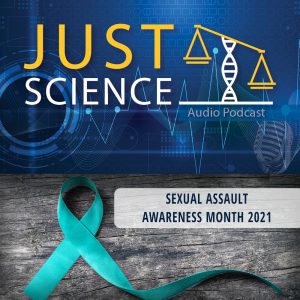 As national efforts to address sexual assault response reform continue to grow, more and more jurisdictions are resolving their sexual assault kit backlog and identifying causes associated with the accumulation of sexual assault kits. In honor of Sexual Assault Awareness Month, Just Science sat down with leaders in the field of sexual assault response reform to talk about current issues in this arena, including the impact of COVID-19. Listen along as our guests discuss methods for supporting victims of sexual assault while presenting considerations and resources for improving sexual assault response reform in this special release season of Just Science.
As national efforts to address sexual assault response reform continue to grow, more and more jurisdictions are resolving their sexual assault kit backlog and identifying causes associated with the accumulation of sexual assault kits. In honor of Sexual Assault Awareness Month, Just Science sat down with leaders in the field of sexual assault response reform to talk about current issues in this arena, including the impact of COVID-19. Listen along as our guests discuss methods for supporting victims of sexual assault while presenting considerations and resources for improving sexual assault response reform in this special release season of Just Science.
This episode of Just Science is funded by the National Institute of Justice’s Forensic Technology Center of Excellence.
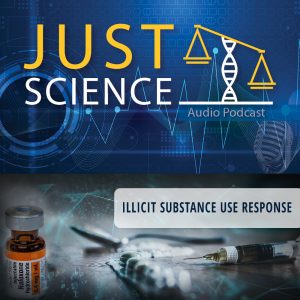 Despite national efforts to reduce the impact, illicit substance abuse continues to rise in the U.S. The Centers for Disease Control and Prevention report that there were an average of 128 opioid related deaths per day in 2018. These numbers continue to rise. In order to meet the challenge head on, scientists, community leaders, justice professionals, and everyday citizens are working tirelessly to slow the abuse of opioids and reduce the impact that they have on our communities. In this season of Just Science, we’re sitting down with experts in the field to discuss topics like stigma, recovery, policy solutions, public safety systems, identifying drug trends, and much more.
Despite national efforts to reduce the impact, illicit substance abuse continues to rise in the U.S. The Centers for Disease Control and Prevention report that there were an average of 128 opioid related deaths per day in 2018. These numbers continue to rise. In order to meet the challenge head on, scientists, community leaders, justice professionals, and everyday citizens are working tirelessly to slow the abuse of opioids and reduce the impact that they have on our communities. In this season of Just Science, we’re sitting down with experts in the field to discuss topics like stigma, recovery, policy solutions, public safety systems, identifying drug trends, and much more.
This season is funded in part by the Bureau of Justice Assistance’s Comprehensive Opioid, Stimulant, and Substance Abuse Program and the National Institute of Justice’s Forensic Technology Center of Excellence.
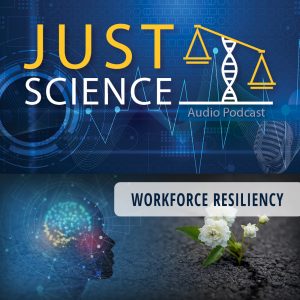 Just Science is excited to release our next mini season: Workforce Resiliency. From sexual assault nurse examiners (SANEs) to medicolegal death investigators (MDIs), this season takes a closer look at forensic science practitioners performing their jobs under difficult circumstances. Tune in as we discuss the realities of work-related stress and vicarious trauma, as well as strategies to mitigate their effects in this new season of Just Science.
Just Science is excited to release our next mini season: Workforce Resiliency. From sexual assault nurse examiners (SANEs) to medicolegal death investigators (MDIs), this season takes a closer look at forensic science practitioners performing their jobs under difficult circumstances. Tune in as we discuss the realities of work-related stress and vicarious trauma, as well as strategies to mitigate their effects in this new season of Just Science.
This season is funded by the National Institute of Justice’s Forensic Technology Center of Excellence.
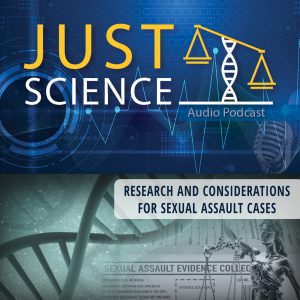 In response to the success of our sexual assault response reform mini season for Sexual Assault Awareness Month in April of 2021, Just Science is excited to release our next season: Research and Considerations for Sexual Assault Cases. This multi-faceted season covers a variety of topics within the arena of sexual assault response reform, including sexual assault kit standardization, crossover offending, lawfully owed DNA, victim-centered interviewing, touch DNA, partially tested sexual assault kits, and much more. Tune in as we unpack sexual assault myths and address some of the key issues currently associated with sexual assault response reform in this new season of Just Science.
In response to the success of our sexual assault response reform mini season for Sexual Assault Awareness Month in April of 2021, Just Science is excited to release our next season: Research and Considerations for Sexual Assault Cases. This multi-faceted season covers a variety of topics within the arena of sexual assault response reform, including sexual assault kit standardization, crossover offending, lawfully owed DNA, victim-centered interviewing, touch DNA, partially tested sexual assault kits, and much more. Tune in as we unpack sexual assault myths and address some of the key issues currently associated with sexual assault response reform in this new season of Just Science.
This season of Just Science is funded by the National Institute of Justice’s Forensic Technology Center of Excellence.
2020 Seasons & Special Release Episodes
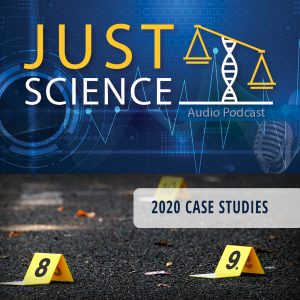 Criminal investigations often necessitate the application of a multitude of forensic disciplines. While some cases can be solved by a single piece of evidence, most have a myriad of evidence types to forward and investigation. Bloodstains, DNA analysis, latent prints, digital evidence, and reliable police work lead to arrests and can stop a criminal before any more damage is done. In our latest season, Case Studies, we sat down with a variety of experts and talked about their most interesting cases. Join us as we discuss bloodstain pattern analysis, photography, serial killers, and much more in this dynamic season of Just Science!
Criminal investigations often necessitate the application of a multitude of forensic disciplines. While some cases can be solved by a single piece of evidence, most have a myriad of evidence types to forward and investigation. Bloodstains, DNA analysis, latent prints, digital evidence, and reliable police work lead to arrests and can stop a criminal before any more damage is done. In our latest season, Case Studies, we sat down with a variety of experts and talked about their most interesting cases. Join us as we discuss bloodstain pattern analysis, photography, serial killers, and much more in this dynamic season of Just Science!
This season of Just Science is funded by the National Institute of Justice’s Forensic Technology Center of Excellence.
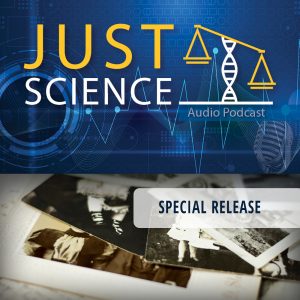 In this Forensic Science Week special episode, Just Science interviews Brett Williams, the CEO of Verogen, about the GEDmatch database, how it can be used by law enforcement to perform forensic genealogy searches for investigative leads, and the short- and long-term plans Verogen has for the widely used database and related services. Listen along with our guest host, Donia Slack, as she and Brett Williams discuss the impact that genetic genealogy and GEDmatch have had on the criminal justice system in this episode of Just Science.
In this Forensic Science Week special episode, Just Science interviews Brett Williams, the CEO of Verogen, about the GEDmatch database, how it can be used by law enforcement to perform forensic genealogy searches for investigative leads, and the short- and long-term plans Verogen has for the widely used database and related services. Listen along with our guest host, Donia Slack, as she and Brett Williams discuss the impact that genetic genealogy and GEDmatch have had on the criminal justice system in this episode of Just Science.
This episode is funded by the National Institute of Justice’s Forensic Technology Center of Excellence.
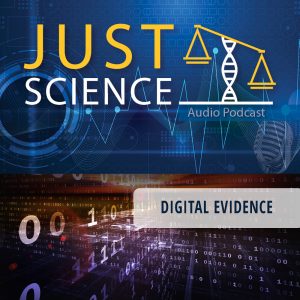 While the realm of digital evidence is still relatively new, it requires validation and testing like all forensic disciplines. Digital evidence is a dynamic discipline that can often provide greater insight into the investigation of a crime or the defense of the alleged perpetrator. In this season of Just Science, we will be covering the history and interpretation of digital evidence, emerging technologies used in investigation and as evidence, and the validation of digital forensic tools.
While the realm of digital evidence is still relatively new, it requires validation and testing like all forensic disciplines. Digital evidence is a dynamic discipline that can often provide greater insight into the investigation of a crime or the defense of the alleged perpetrator. In this season of Just Science, we will be covering the history and interpretation of digital evidence, emerging technologies used in investigation and as evidence, and the validation of digital forensic tools.
This season is funded by the National Institute of Justice’s Forensic Technology Center of Excellence.
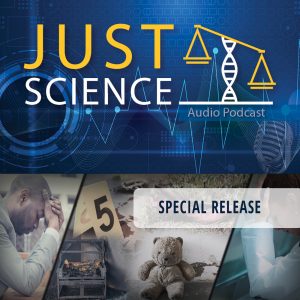 In this special release episode of Just Science, we sat down with Ashley Church and Erin West, founders of Gap Science, to discuss stress and resiliency in crime scene investigators. Traumatic death investigation can have adverse, long-term effects on crime scene analysts. As Ashley Church and Erin West moved through their respective careers, they noticed a lack of training around protecting the psychological well-being of forensic scientists. Gap Forensics is working to fill this void in knowledge and address the challenges that investigators are experiencing every day. Listen along as our guests discuss compassion fatigue, the supervisor’s role in protecting their people, and the impact of violent crime scenes on forensic scientists in this episode of Just Science.
In this special release episode of Just Science, we sat down with Ashley Church and Erin West, founders of Gap Science, to discuss stress and resiliency in crime scene investigators. Traumatic death investigation can have adverse, long-term effects on crime scene analysts. As Ashley Church and Erin West moved through their respective careers, they noticed a lack of training around protecting the psychological well-being of forensic scientists. Gap Forensics is working to fill this void in knowledge and address the challenges that investigators are experiencing every day. Listen along as our guests discuss compassion fatigue, the supervisor’s role in protecting their people, and the impact of violent crime scenes on forensic scientists in this episode of Just Science.
This episode of Just Science is funded by the National Institute of Justice’s Forensic Technology Center of Excellence.
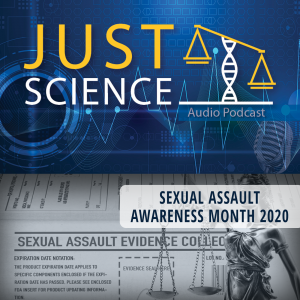 This week on Just Science, we are publishing a special release episode in honor of Sexual Assault Awareness Month. Social distancing, shelter in place, and other responses to COVID-19 can create a stressful environment for survivors of sexual assault especially if they feel they cannot access resources or are physically unable to seek help. In addition, highly stressful situations that result from significant amounts of change, such as unemployment, disruption in ‘normal’ activities, and social isolation may increase the risk of domestic violence and sexual assault. In this podcast, we will discuss what services are available to survivors of sexual assault, including leveraging on-line platforms and modified strategies for first responders, rape crisis centers, and victim advocates. We will also discuss how we as a friend, family member, and community can be prepared to respond to a victim of sexual assault in this challenging time.
This week on Just Science, we are publishing a special release episode in honor of Sexual Assault Awareness Month. Social distancing, shelter in place, and other responses to COVID-19 can create a stressful environment for survivors of sexual assault especially if they feel they cannot access resources or are physically unable to seek help. In addition, highly stressful situations that result from significant amounts of change, such as unemployment, disruption in ‘normal’ activities, and social isolation may increase the risk of domestic violence and sexual assault. In this podcast, we will discuss what services are available to survivors of sexual assault, including leveraging on-line platforms and modified strategies for first responders, rape crisis centers, and victim advocates. We will also discuss how we as a friend, family member, and community can be prepared to respond to a victim of sexual assault in this challenging time.
This episode of Just Science is funded by the National Institute of Justice’s Forensic Technology Center of Excellence.
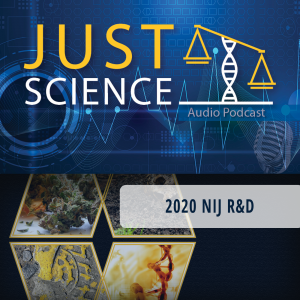 The 2020 NIJ R&D Season of Just Science features some of the research presented at the National Institute of Justice’s Forensic Science Research and Development Symposium. Some of the interviews in this season were recorded at the 2020 AAFS 72nd Annual Scientific Meeting in Anaheim, CA, a professional meeting where attendees work to advance science, foster research, and promote collaboration within the various forensic science disciplines. This season’s topics include the analysis of fentanyl compounds in emerging drugs, a tool for species identification of skeletal remains, methods for analyzing beverages for cannabinoids, the detection of firearm discharge via electrochemical sensors, and more. Tune in this spring to learn more about NIJ’s diverse research portfolio!
The 2020 NIJ R&D Season of Just Science features some of the research presented at the National Institute of Justice’s Forensic Science Research and Development Symposium. Some of the interviews in this season were recorded at the 2020 AAFS 72nd Annual Scientific Meeting in Anaheim, CA, a professional meeting where attendees work to advance science, foster research, and promote collaboration within the various forensic science disciplines. This season’s topics include the analysis of fentanyl compounds in emerging drugs, a tool for species identification of skeletal remains, methods for analyzing beverages for cannabinoids, the detection of firearm discharge via electrochemical sensors, and more. Tune in this spring to learn more about NIJ’s diverse research portfolio!
This season of Just Science is funded by the National Institute of Justice’s Forensic Technology Center of Excellence.
 The American Academy of Forensic Sciences (AAFS) Humanitarian and Human Rights Resource Center (HHRRC) seeks to promote humanitarian and human rights action in the field of forensic sciences. This effort would not be possible without the support provided by NIJ’s FTCoE and AAFS. The HHRRC improves the practice of forensic science and strengthens its impact on humanitarian and human rights issues through education and dissemination of best practices and guidelines. In this Just So You Know episode, Just Science sat down with Dr. Duarte Nuno Vieira and Dr. Cláudia Plens for a look at how NIJ’s support of the HHRRC aids their mission. Tune in as we gain a broader understanding of humanitarian forensic action and how the HHRRC impacts forensic research around the world.
The American Academy of Forensic Sciences (AAFS) Humanitarian and Human Rights Resource Center (HHRRC) seeks to promote humanitarian and human rights action in the field of forensic sciences. This effort would not be possible without the support provided by NIJ’s FTCoE and AAFS. The HHRRC improves the practice of forensic science and strengthens its impact on humanitarian and human rights issues through education and dissemination of best practices and guidelines. In this Just So You Know episode, Just Science sat down with Dr. Duarte Nuno Vieira and Dr. Cláudia Plens for a look at how NIJ’s support of the HHRRC aids their mission. Tune in as we gain a broader understanding of humanitarian forensic action and how the HHRRC impacts forensic research around the world.
This episode of Just Science is funded by the National Institute of Justice’s Forensic Technology Center of Excellence.
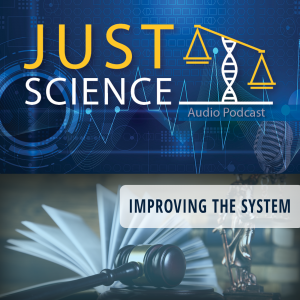 Researchers, academics, and forensic scientists are constantly striving to make improvements to existing processes within the criminal justice system. While many advancements have been made in recent years, there will always be room for growth and change. To begin 2020, Just Science will be meeting with leaders in the field to discuss the current state of the criminal justice system and the advancements they anticipate in the coming years. Listen along as we talk to representative from the National Institute of Justice, the National Institute of Standards and Technology, and the Innocence Project about their efforts to support and improve the criminal justice system.
Researchers, academics, and forensic scientists are constantly striving to make improvements to existing processes within the criminal justice system. While many advancements have been made in recent years, there will always be room for growth and change. To begin 2020, Just Science will be meeting with leaders in the field to discuss the current state of the criminal justice system and the advancements they anticipate in the coming years. Listen along as we talk to representative from the National Institute of Justice, the National Institute of Standards and Technology, and the Innocence Project about their efforts to support and improve the criminal justice system.
This episode of Just Science is funded by the National Institute of Justice’s Forensic Technology Center of Excellence.
2019 Seasons & Special Release Episodes
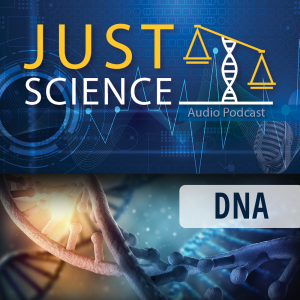 DNA evidence has had a significant impact on the criminal justice system. Since the National Commission on the Future of DNA evidence in the 1990s, DNA has evolved into one of the most respected disciplines in forensic science. The DNA season of Just Science focuses on DNA evidence and its use in forensic investigation. Topics include the impact of DNA evidence, the use of familial DNA in investigations, databases, case studies, and strategies to improve workflow efficiencies.
DNA evidence has had a significant impact on the criminal justice system. Since the National Commission on the Future of DNA evidence in the 1990s, DNA has evolved into one of the most respected disciplines in forensic science. The DNA season of Just Science focuses on DNA evidence and its use in forensic investigation. Topics include the impact of DNA evidence, the use of familial DNA in investigations, databases, case studies, and strategies to improve workflow efficiencies.
This season of Just Science is funded by the National Institute of Justice’s Forensic Technology Center of Excellence.
The last Census of Medical Examiners and Coroners was conducted in 2004 and stands as one of the most important resources for budget makers and policy changers. Since then, the realm of MDI has changed dramatically. With that in mind, BJS and RTI International are working tirelessly to create a useful tool that captures all the nuances of this field. Listen in as our guests discuss the development of the survey, the types of data being collected, and the impact that the survey will have on the MDI community. Unchanged: The last Census of Medical Examiners and Coroners was conducted in 2004 and stands as one of the most important resources for budget makers and policy changers. Since then, the realm of MDI has changed dramatically. With that in mind, BJS and RTI International are working tirelessly to create a useful tool that captures all the nuances of this field. Listen in as our guests discuss the development of the survey, the types of data being collected, and the impact that the survey will have on the MDI community.
This episode is funded by the National Institute of Justice’s Forensic Technology Center of Excellence.
The 2019 NIJ R&D Season of Just Science will focus on the research featured at the National Institute of Justice’s Forensic Science Research and Development Symposium. Some of these interviews were recorded at the 2019 AAFS 71st Annual Scientific Meeting in Baltimore, Maryland. This conference, held by the American Academy of Forensic Sciences, is a multidisciplinary professional meeting that provides leadership and opportunities to advance science, foster research, and promote collaboration within the various forensic science disciplines. Some of the episode topics include research with alternative light sources and bruising, infant abuse, age estimations of bloodstains, image cloud platform use, raman microspectroscopy, and much more.
This season is funded by the National Institute of Justice’s Forensic Technology Center of Excellence.
April is Sexual Assault Awareness Month, a campaign designed to raise awareness about sexual violence and provide methods to prevent it. In honor of Sexual Assault Awareness Month, Just Science interviewed Pat Speck, a Board-Certified Family Nurse Practitioner and professor at the University of Alabama – Birmingham School of Nursing, about sexual assault testing and victim-centered care. Just Science also sat down with Dr. Kevin Strom and Dr. Patricia Melton of the SAKI Training and Technical Assistance project to discuss the SAKI TTA program, its impact, and the support SAKI TTA provides the community.
This season of Just Science is funded in part by RTI International’s Applied Justice Research Division and the National Institute of Justice’s Forensic Technology Center of Excellence [Award 2016-MU-BX-K110]. Please view the individual episode pages for more information about episode funding.
The Identification season of Just Science will focus on many of the different aspects of identification in forensic investigations. A majority of these interviews were recorded at the 2018 International Forensic Educational Conference in San Antonio, Texas. This conference, held by the International Association for Identification, represents a diverse and knowledgeable membership that meets annually to educate and share techniques, methods, and research into the various forensic science disciplines. The conference features lectures, poster presentations, and workshops dedicated to sharing knowledge and enhancing the forensic sciences. This season will include episodes covering sexual assault kit processing, psychological survival in violent careers, latent print examination, forensic art, microanthropology, and more.
This episode of Just Science is funded by the National Institute of Justice’s Forensic Technology Center of Excellence.
2018 Seasons & Special Release Episodes
Unchanged: The Forensic Advancement season of Just Science will focus on many areas that challenge forensic leadership within the community. A majority of these interviews were recorded at the 2018 American Society of Crime Lab Directors (ASCLD) Annual Symposium in Atlanta, Georgia. The ASCLD Symposium is an industry-leading conference designed for leaders and managers in the forensic laboratory space. The symposium boasts workshops and plenary talks designed around all aspects of forensic science, but particularly focuses on enhancing leadership and management in a forensic laboratory. This season will include episodes covering performance tools, ASCLD efforts in rapid DNA, return on investment for DNA databases, witness testimony, millennial personnel, laboratory public relations, and more.
This season of Just Science is funded by the National Institute of Justice’s Forensic Technology Center of Excellence.
The American Academy of Forensic Sciences (AAFS) Humanitarian and Human Rights Resource Center (HHRRC) seeks to promote humanitarian and human rights in the field of forensic sciences and the NIJ. The FTCoE will help to support key international agencies chosen by the HHRRC to improve the practice of forensic science and strengthen its impact on humanitarian and human rights issues through training and education and dissemination of best practices and guidelines. Some of the main focuses for the program are evidence preservation, training, research, and capacity building around the world. Research discussed in this Just So You Know episode includes looking at skeletal remains from the mass violence in Cambodia, develop the capacity of anthropology in Mexico, how nerve agents are incorporated into bones, and much more. Just Science interviews Dr. Douglas Ubelaker about the HHRRC’s efforts and his contributions to an in-brief about how the NIJ’s Forensic Technology Center of Excellence aids their mission.
This episode of Just Science is funded by the National Institute of Justice’s Forensic Technology Center of Excellence.
Just Science is releasing a special Medicolegal Death Investigation series to discuss topics such as vicarious trauma, forensic nurse coroners, different medicolegal death investigation systems, and planning for the aftermath of a mass shooting. Guests include John Fudenberg, Bobbi Jo O’Neal, and Kelly Keyes.
This season of Just Science is funded by the National Institute of Justice’s Forensic Technology Center of Excellence.
Just Science is releasing a season for the 2018 NIJ funded Research and Development. These guests were NIJ awardees that traveled to the annual AAFS Symposium this year in Seattle, Washington. Dive into the community’s efforts to forward science and create a stronger justice system through knowledge. Some of the episode topics include research with skin microbiomes, SNP genotypes, implementing portable mass spec, and CT image databases.
This episode of Just Science is funded by the National Institute of Justice’s Forensic Technology Center of Excellence.
This Just So You Know episode was produced in remembrance of Dr. Antonio Cantu who passed away Friday, June 29, 2018. Listen along as Joseph Stephens, from the FBI Laboratory, discusses how Dr. Cantu shaped his forensic career and overall outlook on work and friendship.
“Dr. Cantu worked as a Forensic Scientist for the Bureau of Alcohol, Tobacco, Firearms and Explosives (ATF), Federal Bureau of Investigation (FBI), Central Intelligence Agency (CIA) and served as Chief Scientist for the Forensic Service Division of U.S. Secret Service (USSS) until he retired in 2007. Dr. Cantu’s expertise included the chemistry of documents and fingerprints. With a relentless commitment to education, love of knowledge and passion for his craft, Antonio touched, inspired and empowered everyone who knew him.” Please click here to read Dr. Cantu’s obituary.
This season of Just Science is funded in part by RTI International’s Applied Justice Research Division.
How do career trajectories differ for Women in Forensics? It’s not just about showcasing academic rigor, producing great research, and chasing grants. This Just So You Know, we speak with Dr. Campo of FIU and touch on creating women leaders in science, academia, STEM, and forensics, and finding a balance between children and careers, while not sacrificing living other parts of life.
This episode of Just Science is funded by the National Institute of Justice’s Forensic Technology Center of Excellence.
In this season, Drugs, topics will range from legalization of marijuana in relation to police officers, the opioid epidemic, Electronic Dance Music Festivals, how witnesses’ and victims’ memory of events can be affected by alcohol, current vaping research, drug courts, and much more.
This episode of Just Science is funded by the National Institute of Justice’s Forensic Technology Center of Excellence.
The forensic science community lost an influential and dedicated leader, Dr. Eric Buel. “Just Science” is releasing a special “Just So You Know” episode interviewing Dr. Max Houck and John Collins, two of Dr. Siegel’s closest colleagues. In this short episode we remember a kind hearted, dedicated educator of forensic scientists, whose reach was felt internationally. The community has lost someone who is considered a forefather for education in forensics, please join us as we celebrate a life that gave so much to his beloved community.
This season of Just Science is funded in part by RTI International’s Applied Justice Research Division.
In this season we will cover content given at the NIJ Forensic Technology Center of Excellence’s Impression Pattern and Trace Evidence Symposium. The symposium was held January 22nd -25th 2018 in Arlington, Virginia, it had over 200 onsite attendees and over 400 online attendees. This season will include episodes discussing nature’s patterns, fracture mechanics, juror’s interpretations of testimony, toolmarks, and footwear with each topic discussing real-world examples. If you missed the symposium and wish to watch the archives, please click here.
This episode of Just Science is funded by the National Institute of Justice’s Forensic Technology Center of Excellence.
2017 Seasons & Special Release Episodes
In this special release season on Leadership, you will hear interviews highlighting different areas where guests have excelled, along with some of their lessons learned. The season will highlight forensic professionals and teachers of leadership including Ben Swanholm, Jody Wolf, Martina Bison-Huckaby, and Jeremy Triplett. We will discuss their personal philosophies on leadership, how they came to be leaders in their own lives, and what their affiliations have added to the conversation. Stay tuned as Just Science helps to shed light on the complex issues of leadership.
This season of Just Science is funded by the National Institute of Justice’s Forensic Technology Center of Excellence.
In this “Just So You Know” episode of Just Science, we discuss this year’s Rapid DNA forum with Chris Asplen, the Executive Director of the National Criminal Justice Association. The 3-day forum, hosted by the Forensic Technology Center of Excellence, was held in Alexandria, VA in August of 2017. This forum provided more than 130 attendees from the forensic DNA community an opportunity to be updated on commercially available Rapid DNA technologies, hear lessons learned from several early adopters spanning local law enforcement and federal agencies, and discuss moving forward as a community. As one of the many distinguished presenters from the forum, Chris discusses how Rapid DNA is moving forward slowly but surely saving jurisdictions time and money, and that getting the policy right is just as important as getting the technology right.
This episode of Just Science is funded by the National Institute of Justice’s Forensic Technology Center of Excellence.
The forensic science community lost an influential and dedicated leader, Dr. Jay Siegel. “Just Science” is releasing a special “Just So You Know” episode interviewing Dr. Max Houck and John Collins, two of Dr. Siegel’s closest colleagues. In this short episode, we remember a kind-hearted, dedicated educator of forensic scientists, whose reach was felt internationally. The community has lost someone who is considered a forefather for education in forensics, please join us as we celebrate a life that gave so much to his beloved community.
This season of Just Science is funded in part by RTI International’s Applied Justice Research Division
In the second season, Case Studies, Just Science interviews the prosecutors, investigators, victims, and crime lab directors that were involved with high profile cases. This season will highlight cases that seemed unsolvable at the time, but with some new technologies and innovation, these criminals were brought to justice. Topics include Munchausen syndrome by proxy, Human Trafficking, Odontology, Atlanta Olympic Bombing, International cases, Louisiana Serial Killer, and many more
This season of Just Science is funded by the National Institute of Justice’s Forensic Technology Center of Excellence.
Just Science released a special season for NIJ funded Research and Development. Dive into the community’s efforts to forward science and create a stronger justice system through knowledge. Episode topics include research with one-pot meth, bath salts, gunshot acoustics, and postmortem interval estimation.
This season of Just Science is funded by the National Institute of Justice’s Forensic Technology Center of Excellence.
The first season of Just Science titled Numbers will give listeners content focusing on issues that forensic scientists are faced with, such as error data or proof of data. We will explore new technologies and systems that provide more efficient ways of delivering quantitative results, as well as the human factors that go into producing solid data.
This season of Just Science is funded by the National Institute of Justice’s Forensic Technology Center of Excellence.

